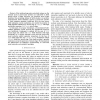978 search results - page 56 / 196 » Knowledge, Probability, and Adversaries |
139
click to vote
INFOCOM
2011
IEEE
14 years 3 months ago
2011
IEEE
—Most existing large-scale networked systems on the Internet such as peer-to-peer systems are vulnerable to Sybil attacks where a single adversary can introduce many bogus identi...
123
click to vote
CHES
2011
Springer
13 years 12 months ago
2011
Springer
Abstract. The paper presents a novel and efficient method to generate true random numbers on FPGAs by inducing metastability in bi-stable circuit elements, e.g. flip-flops. Meta...
STOC
2002
ACM
16 years 6 days ago
2002
ACM
A randomized algorithm is given that solves the wait-free consensus problem for a shared-memory model with infinitely many processes. The algorithm is based on a weak shared coin ...
104
click to vote
FOCS
2006
IEEE
15 years 6 months ago
2006
IEEE
We consider the problems of Byzantine Agreement and Leader Election, where a constant fraction b < 1/3 of processors are controlled by a malicious adversary. The first problem...
117
click to vote
CRYPTO
2001
Springer
15 years 4 months ago
2001
Springer
Consider a scenario where an l-bit secret has been distributed among n players by an honest dealer using some secret sharing scheme. Then, if all players behave honestly, the secre...

